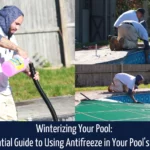As a proud pool owner, you’ve probably noticed how tricky it can be to keep your pool at that perfect, inviting temperature, especially as the season starts to change and there’s a chill in the air.
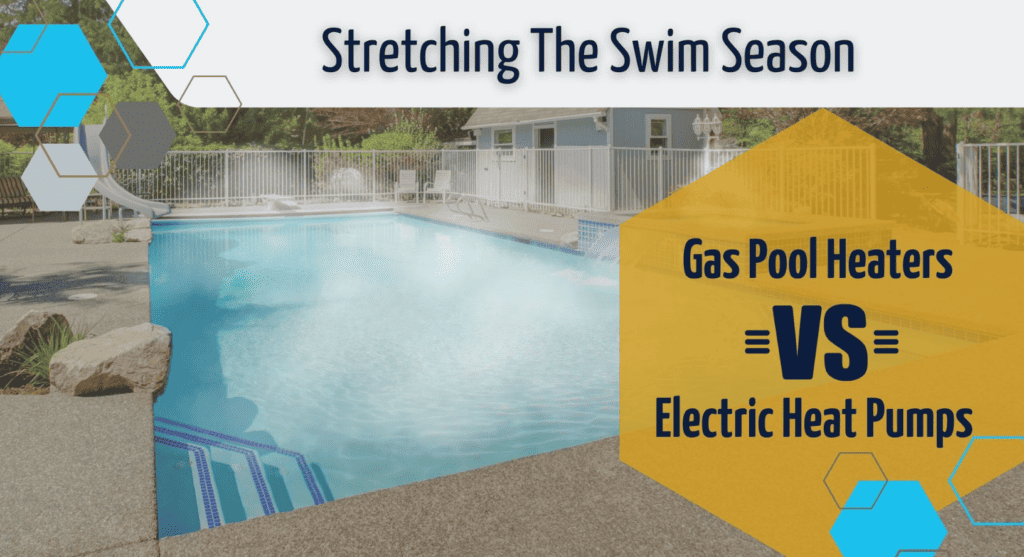
But, there’s good news. Two tried-and-true solutions have made a splash in the pool community: gas pool heaters and electric heat pumps. Each brings its own set of benefits to the table, ensuring you can enjoy every moment of the swimming season.
So, let’s dive in and explore these popular options to keep your pool warm and welcoming, even when the Long Island weather has other plans.
Understanding the Basics
Navigating the world of pool heating can sometimes feel like you’re swimming against the current, especially with all the technical jargon out there. But fret not, fellow Long Island pool enthusiasts. Let’s break it down and wade through the basics together.
Gas Pool Heaters
At their core, gas pool heaters work pretty straightforwardly. They pull in water, heat it using a combustion chamber, and then circulate the warmed water back into the pool. Think of it as giving your pool a warm, cozy blanket on those cooler Long Island nights.
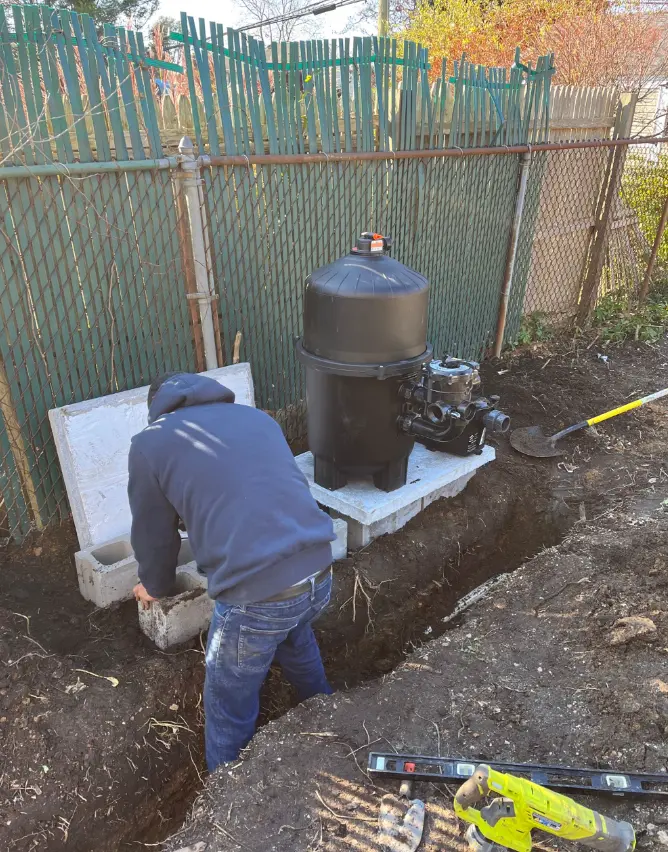
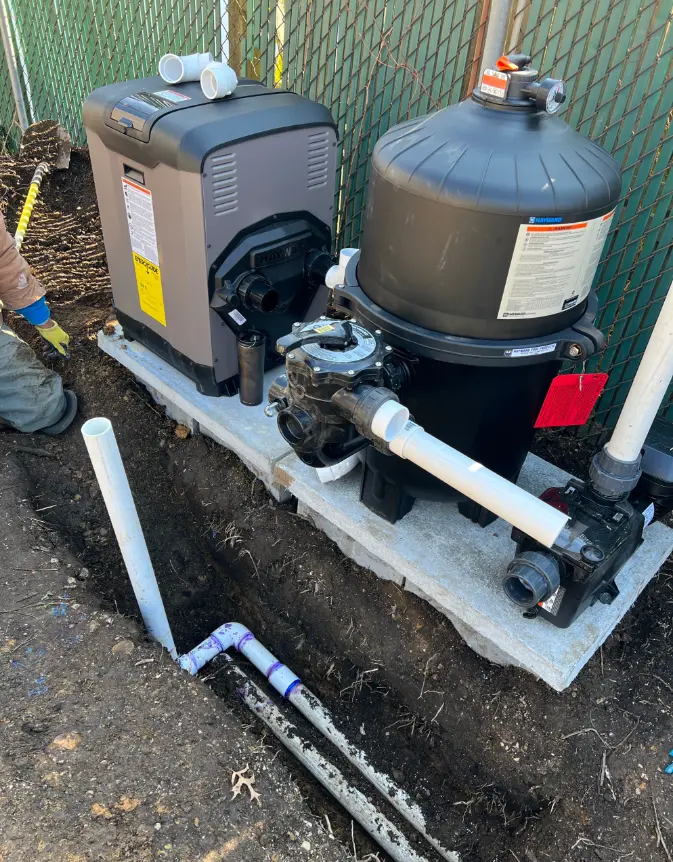
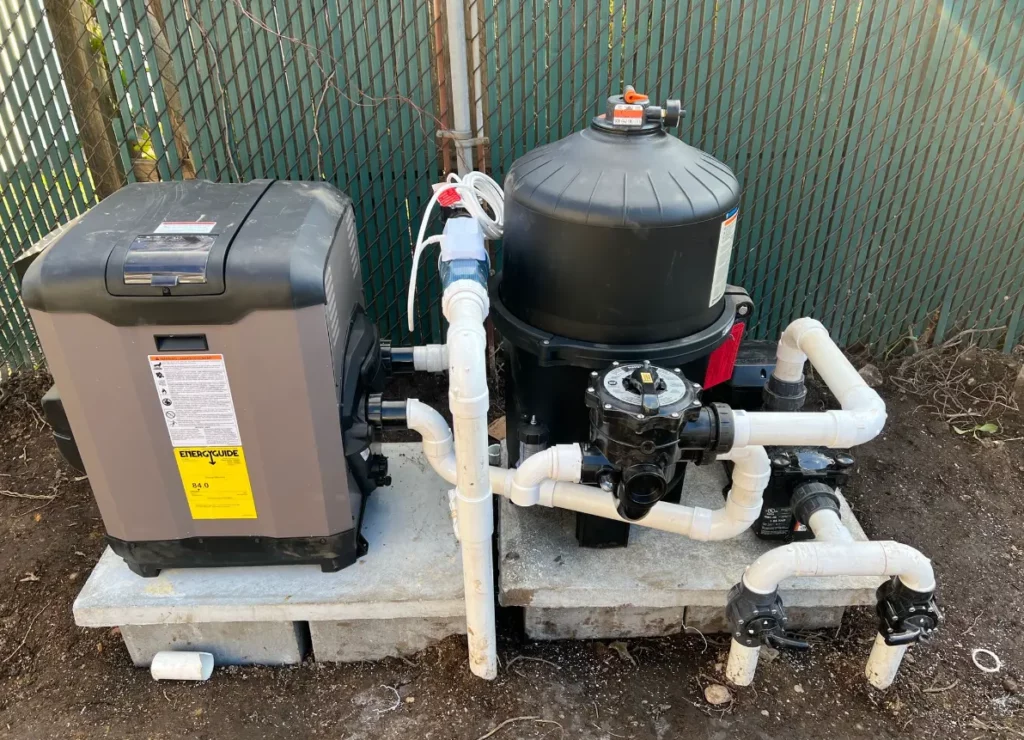
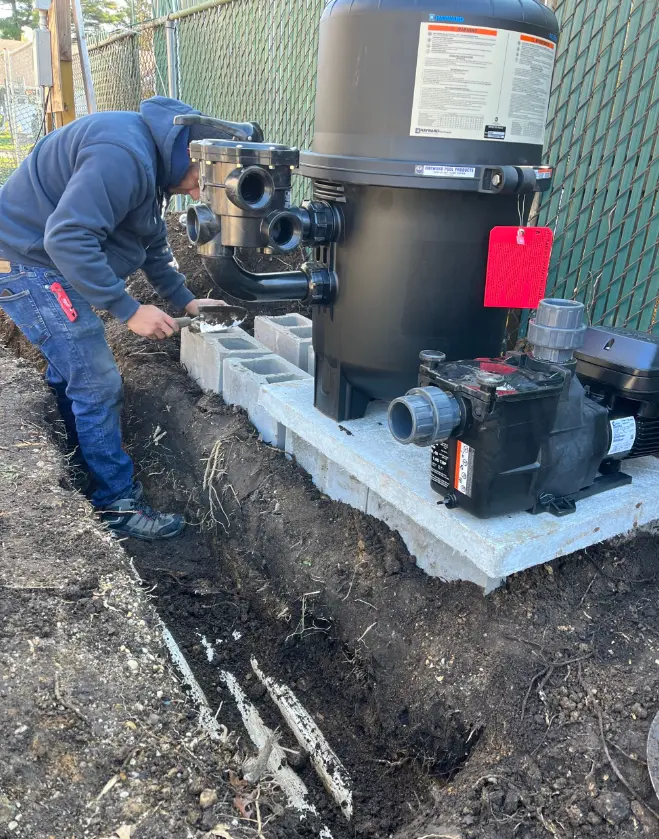
Now, what’s fueling the warmth? Typically, we’re looking at two main types of gas:
- Propane: Often the go-to for homes that aren’t connected to natural gas lines. Propane tanks can be easily refilled and stored.
- Natural Gas: For those of us with a natural gas line in our homes, this can be a seamless and efficient option.
Both have their merits and cater to different needs. And while the mechanics behind them might seem intricate, the goal is simple: letting us enjoy our pools for longer, no matter how unpredictable Long Island weather might be.
Electric Heat Pumps
Alright, Long Island pool aficionados, let’s switch gears and talk about another crowd-favorite: electric heat pumps. Don’t let the name intimidate you; the concept is simpler than you’d think.
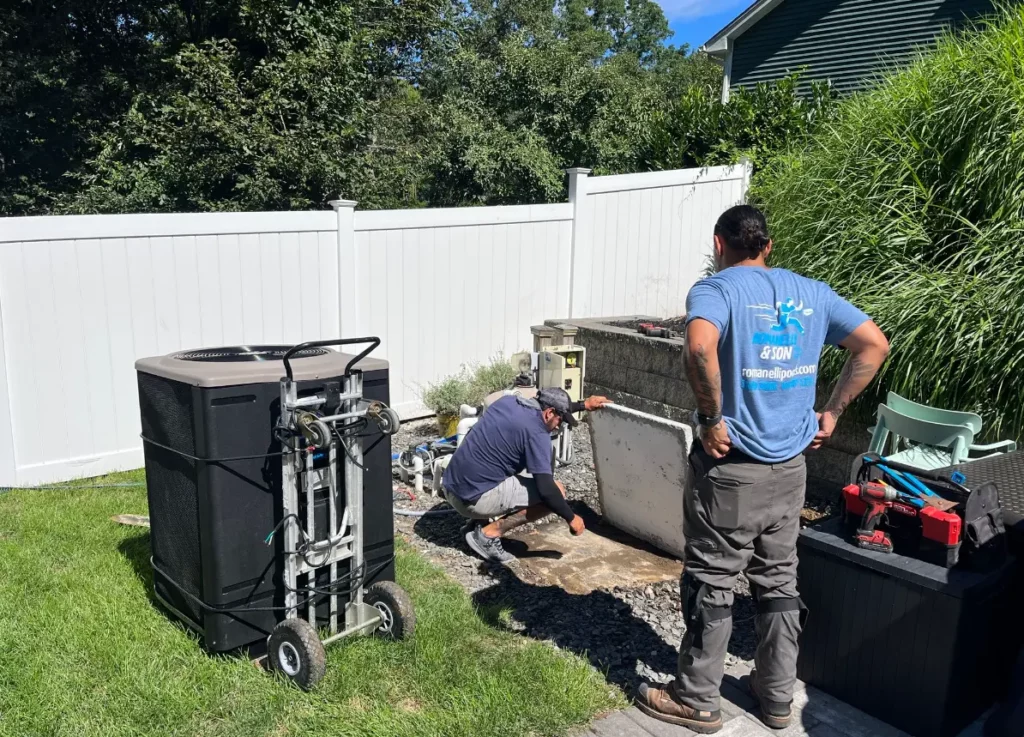
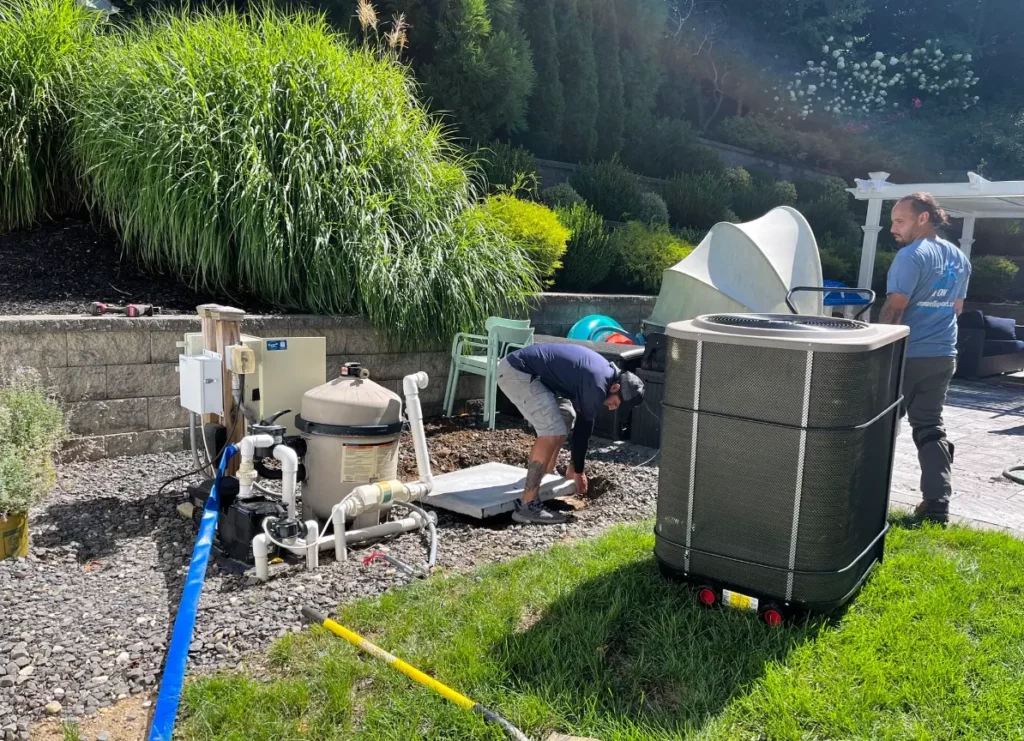
Electric heat pumps don’t generate heat from scratch. Instead, they scout the surrounding air, snatch up any available heat, and with a little magic (or science, rather), transfer that warmth straight into your pool.
This process hinges on the principle of heat exchange.
Picture it this way: imagine you’ve brewed a piping hot cup of coffee and placed it in a chilly room. Over time, your coffee loses its warmth, essentially “exchanging” its heat with the cooler environment.
Electric heat pumps reverse this process.
They pull in the cooler air, extract the heat, amplify it, and then gracefully deliver it to your pool.
For us Long Islanders, this means even when the air feels a tad nippy, there’s still latent warmth out there, and these heat pumps are masters at capturing it for our swimming pleasure. Pretty neat, right?
Gas Pool Heaters: Instant Warmth
When we’re talking about heating things up quickly, the charm of gas pool heaters is like no other. For our fellow long Islanders who’ve experienced that sudden urge for a late-evening swim, you’ll appreciate what these heaters bring to the party.
Pros:
- Speedy Heating: Think of it as the “quick boost” button for your pool. Gas heaters work promptly, ensuring you don’t have to wait around forever, toes tapping, for your pool to reach the desired warmth. Dive in, the water’s fine!
- Consistent Performance in Colder Temperatures: We’ve all been there. Long Island graces us with an unexpectedly cool day, but you’ve already invited friends over for a swim. No worries! Gas heaters keep their cool, or rather, their warmth, even when the mercury dips.
- Various Sizes for Different Pool Dimensions: One size doesn’t always fit all, especially when it comes to our unique Long Island backyards. Whether you’ve got a humble pool or a sprawling lagoon, there’s a gas heater tailored just for your needs.
So, for those who fancy a quick dip without the preamble, gas pool heaters might just be your poolside best friend.
Cons:
Now, while we are big fans of gas pool heaters and their instant warmth magic, it’s only fair that we wade through the deeper waters and address some concerns. Even the best solutions have their flip sides, and it’s always wise to weigh our options fully.
- Higher Operational Costs: Gas heaters, with all their prowess, can sometimes feel like high maintenance. They deliver great warmth, but they can be a bit heavy on the pocket over time, especially with the fluctuating gas prices.
- Environmental Concerns (Carbon Emissions): Now, as much as we love warm pools, it’s essential to keep our beautiful shores and skies in mind. Gas heaters, unfortunately, do contribute to carbon emissions. So, for the eco-conscious among us, this might be a factor worth pondering.
Gas pool heaters offer some undeniable perks, but they come with considerations too.
Electric Heat Pumps: Eco-friendly Comfort
Let’s talk about electric heat pumps, which are becoming increasingly popular among Long Island pool owners who have a soft spot for the environment and their energy bills.
Pros:
- Energy Efficiency: Electric heat pumps are the epitome of “work smarter, not harder.” Instead of creating heat, they’re transferring it, making the most of the energy they consume. Which makes them energy efficient, costing very little comparatively.
- Generally Longer Lifespan: With proper care, these pumps tend to stick around, season after season, making them a solid investment for many Long Island homes.+8878
- Steady and Uniform Temperature Maintenance: Electric Heat pumps ensure that the water temperature doesn’t fluctuate very much, providing a consistent, comfortable swimming experience, even in chilly weather.
For those leaning towards a more sustainable and longer-lasting option, electric heat pumps might just tick all the boxes. Your pool, your wallet, and Mother Nature might all give you a nod of approval.
Cons:
- Slower Heat-up Time: Here’s the thing about electric heat pumps – they’re not the sprinters of the pool heating world. They take their time to bring your pool to the desired temperature. So, if you’re the type who makes spontaneous swimming plans when the clouds part ways on a cool Long Island day, you might find yourself wishing for a faster heat-up.
- Effectiveness Can Drop in Colder Ambient Temperatures: Much like how we might need an extra layer when the North Shore gets nippy, electric heat pumps might struggle a bit. Their efficiency is tied to the warmth in the ambient air, and on those particularly chilly days, they might not perform at their peak.
- Potentially Higher Initial Investment: Quality and eco-friendliness often come with a price tag. While electric heat pumps will likely save you in the long run with their energy efficiency, the initial dip into your wallet might be a tad deeper than other heating options.
At the end of the day, electric heat pumps have their quirks, just like any other solution. Yet, for many in Long Island seeking a balance between comfort, cost-efficiency, and conservation, these pumps might still float right to the top of their list.
Cost Comparison Over Time
Both gas pool heaters and electric heat pumps have their dollar signs attached, and understanding the long game can make all the difference.
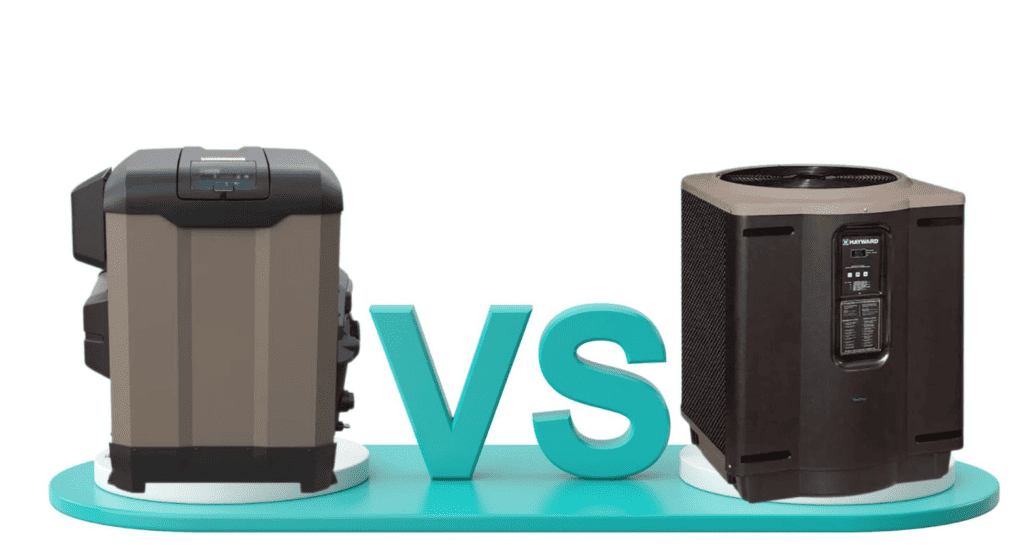
Initial Installation Costs
- Gas Pool Heaters: Typically, these heaters come with a more modest upfront cost. Whether you opt for propane or natural gas will also influence the price. Propane setups might require the addition of a tank, whereas natural gas variants would need a connection to your home’s existing gas line.
- Electric Heat Pumps: While they’re champions of energy efficiency, electric heat pumps do ask for a more significant initial investment. The advanced technology and eco-friendly features built into these systems contribute to their steeper installation cost.
Monthly Operational Costs:
- Gas Pool Heaters: Their quick heating prowess is undoubtedly impressive, but it does come at a price. The monthly operational costs tend to be higher, especially if you’re using your heater frequently. Fluctuating gas prices in our region, whether propane or natural gas, will also play a role in your monthly expenses.
- Electric Heat Pumps: Now, while you might’ve shelled out more at the beginning, the monthly costs are a bit lower. Thanks to their energy-efficient operation, electric heat pumps generally have lower monthly costs. However, it’s essential to keep in mind that electricity rates in Long Island, can sway the savings one way or another.
Environmental Impact
As pool owners, considering the environmental impact of our choices ensures we’re doing our bit to preserve Mother Nature.
Gas Pool Heaters:
- Carbon Footprint and Emissions: Gas pool heaters, while efficient in their heating, do produce greenhouse gas emissions. Every warm swim comes with a side of carbon output. It’s not to say they’re the bad guys, but it’s essential to be aware, especially if we’re collectively aiming to reduce our carbon footprint.
- Environmental Considerations for Sourcing Gas: Where does our gas come from? The extraction and transportation of natural gas and propane come with environmental costs, from habitat disruptions to potential spills. While the convenience and quick heat are tempting, it’s a factor we might want to mull over, especially when we think of our local ecosystems.
Electric Heat Pumps:
- Their Role in Reducing Carbon Footprint: Electric heat pumps, in essence, are the poster children for eco-friendly pool heating. They don’t generate heat but merely transfer it. This efficiency means a considerably reduced carbon footprint, especially when compared to their gas counterparts.
- The Importance of Sourcing Electricity from Renewable Sources: They’re only as green as the electricity that powers them. If your Long Island home is powered by renewable energy sources, like solar or wind, when the environmental gold star shines even brighter. On the other hand, if the electricity comes from non-renewable sources, the environmental impact can be a mixed bag.
Making the Right Choice for Long Island Homes
With all the information, the big question remains: Which is the best choice for your backyard oasis? So, let’s break down the factors that could sway your choice one way or the other.
- Considerations Based on Pool Size: Size does matter when it comes to pool heating. For smaller pools, a gas heater might do the trick, offering quick warmth without breaking the bank. But for those expansive pools where many a summer party is hosted, an electric heat pump could be more cost-effective in the long run, efficiently maintaining temperatures over larger volumes of water.
- Importance of Climate and Average Fall Temperatures in Long Island: We have unpredictable fall temperatures in Long Island. Gas heaters might be your ally during colder days, ensuring that the unexpected swim is still cozy. On the flip side, electric heat pumps, with their steady temperature maintenance, are perfect for those mild temperature variations we sometimes enjoy.
- Personal Priorities: Speed vs. Sustainability: At the end of the day, it’s about what you value most. For those who crave the spontaneity of a quick dip, regardless of the weather, gas heaters are your friends. But if leaving a greener footprint and embracing a sustainable swim is more your pace, electric heat pumps align more with that ethos.
Choosing a pool heater in Long Island isn’t just about today’s swim; it’s about the many seasons to come.
As with any decision, it’s about striking that balance between immediate pleasure and long-term vision.
Maintenance and Lifespan
Maintaining that perfect poolside experience in Long Island requires a little elbow grease and forward-thinking.
Gas Pool Heaters
- Typical Maintenance Needs: Gas pool heaters, like any machinery, have their quirks. Regular check-ups are a must. Keeping an eye on the burner and ensuring that the gas lines are in prime condition will ensure those spontaneous swims are always warm and inviting. Cleaning out debris and making sure there’s proper ventilation are also key to a healthy gas heater.
- Average Lifespan and Replacement Considerations: Gas heaters tend to have a lifespan ranging from 5 to 10 years, based on usage and upkeep. Living in Long Island, with its sea breeze and seasonal changes, might require us to keep a close eye on wear and tear. Regular maintenance and repair are key to maintaining a cost-effective and efficient heating system.
Electric Heat Pumps
- Maintenance Requirements: Electric heat pumps are relatively low-maintenance, but that doesn’t mean we can be hands-off. Regularly cleaning the evaporator coils and ensuring airflow isn’t obstructed by leaves or other debris is crucial. Also, having a professional check the refrigerant levels occasionally can help maintain optimal efficiency.
- Durability and When to Consider Replacement: These units are the marathon runners of the pool heating world. With good care, they can last anywhere from 10 to 15 years. That said, Long Island’s climate and the quality of maintenance can influence this. When performance drops or energy bills start rising unexpectedly, it might be time to consider a replacement.
Conclusion
And there we have it!
The ups and downs of pool heating options fit our beautiful Long Island homes. Whether you’re looking for the swift warmth of a gas heater or the sustainable embrace of an electric heat pump, the choice is personal.
It’s about your pool and your priorities. Here at Romanelli & Son Pool Service, we encourage every pool to make decisions rooted in knowledge, reflecting the unique needs of their home and lifestyle.

